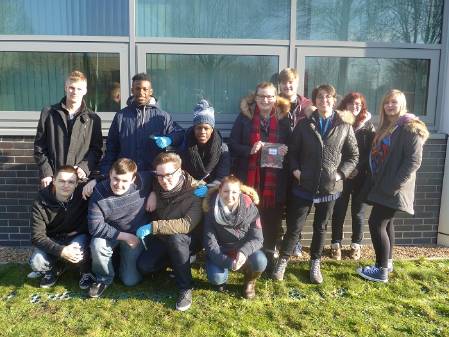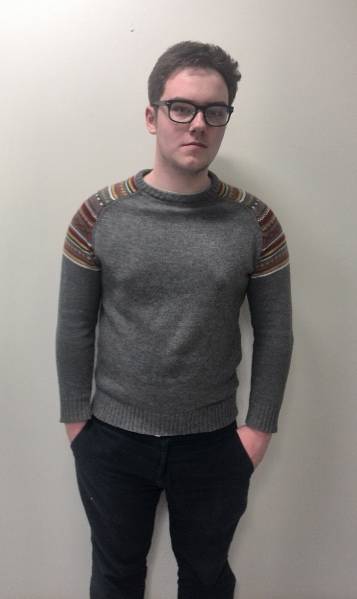MidKent College are one of the 140 schools and community groups to take part in The Microverse so far. We asked two of their students, studying for a BTEC Extended Diploma in Applied Science, to tell us what got them excited about microorganisms, DNA and taking part.
The team at MidKent College pausing for a group photo while collecting microbial specimens for The Microverse.
Here's Emmanuel Shobande:
We were informed about the Microverse project during a lesson and a majority of the class took a keen interest in what Alison, our lecturer, was saying. On the day, every member of the class went outside to collect biological samples from one side of the college building.
I took interest in the project as I wish to study Biomedical Science at university, so collecting data and analysing it is something I take an interest in. The course involves lots of research and analysis of data, so this project would be a great way to enhance my CV, thus making me more employable when applying for a job/placement.
But what inspired me was the fact that the data that I collected was going to be published and used for DNA analysis, which could help scientists identify the types of microorganisms with potential nutrient deficiencies, those living in wet/dry conditions and those which are housed in areas of high pollution from different areas and on different buildings. For scientists to say that they are to travel the whole world and swab every building for living microorganisms would be a very time-consuming and expensive task, which is why we, as future scientists, have been given such a great opportunity to get involved in the collection of data, which could one day help identify a new form of microorganism which may not have been studied prior to the project. Who knows, our data could one day be quite essential!
Emmanuel Shobande, studying for a BTEC Extended Diploma in Applied Science
And now for Max Squires:
To be part of an actual scientific project has helped me gain a range of microbiological skills which will help me with my Biomedical Science course at university. It has made me feel like an actual scientist by helping to gather data which will be analysed and be part of informative research about the microbiological life within urban ecosystems. As part of this, my class swabbed the exterior college building to hopefully identify the types of microorganisms that live in similar conditions across the UK.
This project has got me thinking of the life of microorganisms in urban environments. In built up environments, such as the college building which was swabbed, there are not many nutrients for microorganisms to thrive, there are high levels of pollution which can affect how microbes thrive and different weather conditions in which the microbes are exposed to (rain, hot weather, snow, etc.).
Could the high levels of pollution, possible lack of nutrients and harsh weather conditions inhibit microbiological life? In theory, microbes thrive in warm, moist, oxygen-rich environments and if one thinks about it, urban environments provide these factors, so it is very likely to find microbes in urban environments. Identifying specifically what microbes live in these environments will help us map out where each different microbe lives and possibly identify many new biofilms, which can give us an idea how microbes interact with each other to thrive.
It has been a great opportunity to be part of this research. It feels great knowing that an actual sample I collected will be analysed by top scientists and will be used in actual scientific research! It has got me thinking of the life in urban environments on a microscopic scale and has allowed me to develop my practical skills in science giving me a good start at university and in the future.
Max Squires, studying for a BTEC Extended Diploma in Applied Science.
The Microverse is a citizen science project, suitable for A-level Biology students or equivalent, and also community groups. The project takes you out of the classroom to gather microorganisms for DNA analysis, as part of our cutting edge research into the biodiversity and ecology of the microbial world. Free to participate, you can find out more at: http://www.nhm.ac.uk/microverse/





